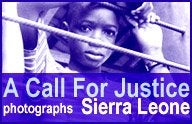 Sierra Leone: Justice and the Special Court
Sierra Leone: Justice and the Special CourtPress Release, Nov. 1, 2000 |
Security Council Members
Your Excellency,
The establishment of a Special Court for Sierra Leone is an urgent and landmark test of the commitment of the international community to recognize and bring to justice the most responsible perpetrators of abuse in this exceptionally brutal conflict. To this end, Human Rights Watch welcomes the Report of the Secretary-General. However, we urge the Security Council to approve a statute for the Special Court whose terms will empower it to act effectively, and create a precedent for strong cooperation between national and international justice efforts. We believe that the proposed statute of the Special Court will require amendments to this end.
|
It is critical that the Special Court be vested with Chapter VII powers of enforcing international cooperation at every stage. |
We are especially concerned that the Special Court may not be able to consider evidence against the most culpable perpetrators of atrocities in Sierra Leone because of the proposed statute's restrictive scope of temporal jurisdiction. As currently drafted, the Special Court may try only crimes committed since November 30, 1996, rather than from the war's inception in March of 1991. Yet from its start, the war was marked by numerous massacres and other atrocities against civilians. Given the very minimal documentation of abuses as yet performed either by the government or civil society groups of Sierra Leone, a truncated scope of temporal jurisdiction may impose grave evidentiary hurdles to any prosecutor attempting to show the responsibility of those in command. For example, between March 15, 1997 and the signing of the Lomé Accord, Foday Sankoh, the leader of the Revolutionary United Front, was in Nigeria under house arrest and imprisoned in Sierra Leone. Before an endorsement of the temporal jurisdiction provision is given by the Security Council, its members should carefully weigh the implications for successful prosecution of the most heinous crimes against the civilians of Sierra Leone, regardless of which party to the conflict committed them.
Human Rights Watch also recommends that the Special Court for Sierra Leone does not try persons who were under the age of eighteen at the time they allegedly committed a crime within the court's jurisdiction. Although we believe that children should be accountable for their offenses, in light of their inherent immaturity as well as the subjection of many child combatants to forcible abduction, brutalization and other forms of coercion, we recommend that the Special Court's limited resources would be far better used in pursuit of justice for adult offenders, rather than children.
We likewise recommend against the definition of the crime of recruitment of child soldiers as "abduction and forced recruitment of children under the age of fifteen years into armed forces or groups for the purpose of using them to participate actively in hostilities." This formulation considerably narrows the well-established prohibition on any recruitment or use of children in Protocol II to the Geneva Conventions of 1949, the Convention on the Rights of the Child, and the crime as defined in the Statute of the International Criminal Court, all treaties to which Sierra Leone is a party. The definition should be amended to include as a war crime any recruitment or use in hostilities of children under the age of fifteen.
Finally, we believe the Security Council, in approving a statute revised in accordance with the above recommendations, should reiterate its understanding that crimes of sexual violence may constitute war crimes or crimes against humanity. This principle, now firmly established in international law, should be explicitly endorsed to ensure that both international and local participants in the Special Court take such crimes within their mandate to aggressively investigate and prosecute.
Thank you for your attention to this important issue. With best regards,
Sincerely,
/s/
Kenneth Roth
Executive Director